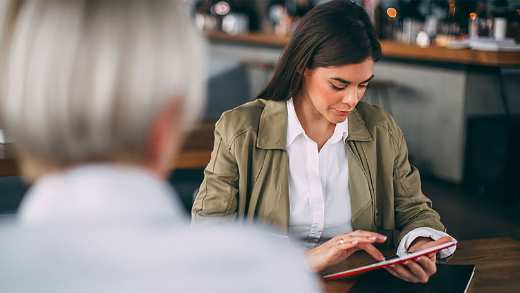Are you paying more tax than you need to?
There are practical things you can do to reduce your tax bill to make year-end tax planning much less taxing.

Your exact tax position will depend on your circumstances and may change in the future.
If you want to learn more about utilising your tax allowances speak to your adviser. If you don't already have an adviser, you can get tailored advice from Aviva Financial Advice or find an independent financial adviser on unbiased.co.uk. Remember you might be charged for any financial advice you receive.
Share assets with your spouse or civil partner
If your spouse, or civil partner, isn't using their full personal tax allowance you can transfer taxable assets to them to cut your own tax bill.
For example, you could transfer a deposit account from your name to your spouse's or partner's, so that the interest becomes theirs. The same applies to share dividends, income from property and income from investment funds such as OEICs (open-ended investment companies).
Use your pension contributions to maximise your state benefit entitlement
The chancellor has announced for the 2025/2026 tax year, the High Income Child Benefit Charge affects parents earning over £60,000.
If the earnings of either parents goes over the threshold, Child Benefit is withdrawn on a tapered basis by the High Income Child Benefit Charge.
A pension contribution has the effect of reducing your taxable income. For example, if your income was £65,000 and you paid £15,000 into your pension, this would have the effect of reducing your income (for the purpose of calculating child benefit allowance) to £50,000. Not only will you get 40% tax relief on any money you pay into your pension, from April 2025, if you've got two kids you'll reclaim £2,212.60 in child benefit.
Child benefit for two children alone is equivalent to a pay rise of approximately £3,000, when you take income tax and national insurance into account.
Capital Gains Tax
When you're selling assets make sure to take advantage of your Capital Gains Tax allowance. For the 2025/2026 tax year it's £3,000. That means you can make a gain of up to £3,000 across your assets before paying tax.
Capital gains are taxed at different rates according to your income. If you sell assets that qualify for capital gains, including any additional properties you own, you'll be be taxed at 18% if you're a basic rate taxpayer or 24% if you're a higher rate taxpayer.
If you've lived with your spouse or civil partner in the relevant tax year and aren't separated, you can reduce your capital gains tax bill by transfering ownership of assets to them.
For example, if you're planning to sell shares that'll give you a profit of £4,000, you can use your allowance to cover the first £3,000 of the gain. However, the other £1,000 would be taxable at up to 18% if you're a basic rate tax payer.
Transferring half the shares to your spouse before selling them would mean that you'd each make a £2,000 gain, which is within both of your £3,000 capital gains tax annual allowances and your total tax bill would be zero.
Bear in mind, however, you can't temporarily transfer ownership to your spouse or civil partner as this is tax evasion. Your spouse or civil partner would legally own the asset and be entitled to it if you were to separate.
Giving to charity/gift aid
The tax-year end is also a good time to think about donating to charity. These gifts reduce your tax bill in a similar way to pension contributions. If you live in England or Wales, gifts made under the Gift Aid scheme qualify for immediate tax relief at 20%, with higher or additional rate taxpayers claiming back the difference via self-assessment. You may be asked to give evidence of a gift when claiming back the extra 20% or 25% at the tax-year end, so make sure you keep good records and get receipts.
Gifts made to charities also count as exempt transfers for inheritance tax, which means they don’t count as part of your estate as soon as they are made.
The starting rate for savings and the personal savings allowance
The starting rate for savings is available to those whose non-savings income and savings income added together is less than their personal allowance plus £5,000. For example, assuming you qualify for the full personal allowance of £12,570, you could benefit from the starting rate for savings as long as your total taxable income is less than £17,570.
The starting rate for savings can add an extra nil-tax allowance of up to £5,000 to cover savings income, but the allowance is reduced where income and non-savings income (earnings, pension income) is more than your personal allowance. This isn't available once your total income reaches £17,570.
The personal savings allowance means that basic rate taxpayers can earn up to £1,000 interest on their cash savings accounts each tax year without having to pay tax and higher-rate taxpayers can earn up to £500 of interest. Those in the highest tax bracket, earning over £125,140 a year, do not benefit from the allowance.
If you only get income from your savings, then using your personal allowance, the starting rate for savings and your personal savings allowance together means you could earn interest of up to £18,570 without paying tax.
Tax rules for income from share dividends and other shares-based investments
When it comes to dividends from shares-based investments, including direct investments in shares and OEICs (Open-Ended Investment Company) and unit trusts investing mainly in shares, everyone now has a tax free dividend allowance of £500 (2025/2026).
You'll pay tax on any dividends over the £500 allowance, with the rate depending on whether your total income puts you in the basic, higher or additional rate tax band. The rates currently applied to these bands are 8.75%, 33.75%, and 39.35%.



